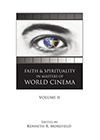- Author(s): Irena S. M. Makarushka
- When: 1998-04
- Where: Journal of Religion and Film
This analysis of Breaking the Waves falls into two sections: 1) the 'good'; and 2) transgressing goodness. The focus is Bess, her status as woman in a patriarchal culture and her struggle to be 'good'. The reading that I propose explores von Trier's meditation on competing notions of goodness and the cultural assumptions that inform them. In the first section, I explore how Bess negotiates the moral landscape within which she lives as daughter, sister-in-law, member of a religious community, and wife. The church elders and Bess represent von Trier's vision of the two extremes of the contested notion of the 'good'.
In the second section, I consider how the tension between a static and a dynamic understanding of the 'good' is experienced. What choices are available to Bess as she struggles to make sense of her life in the aftermath of Jan's accident? How does she reimagine her desire to be a 'good girl' under these circumstances?
As I reflect on the 'good' as a moral category, I turn to Female Perversions by Louise J. Kaplan, who argues that submission and purity are culturally encoded expectations of femininity and consequently, of what it means to be a 'good' woman. These expectations function to demean and constrain women. I explore the unfolding of Bess's desire and inquire whether she does indeed choose out of her own sense of freedom, whether she is coerced or both. Bess's desire to be 'good' by transgressing culturally constructed values offers an insight into the cost to women for making choices informed by a deeply held personal belief in goodness.







